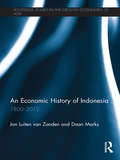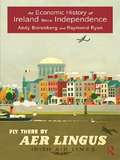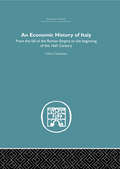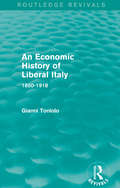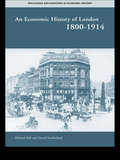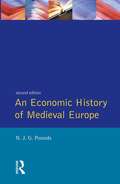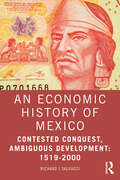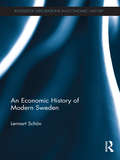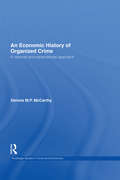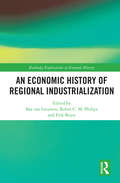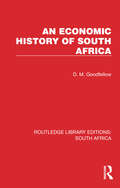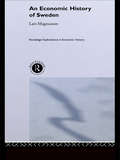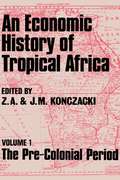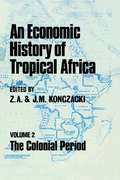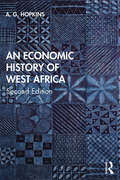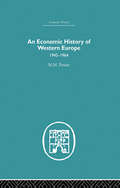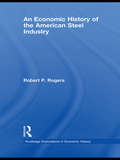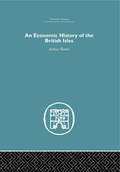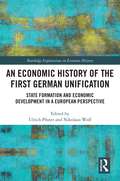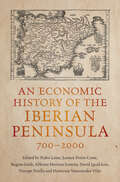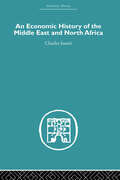- Table View
- List View
An Economic History of India: Growth, Income and Inequalities from the Mughals to the 21st Century (Cambridge Studies in Economic History - Second Series)
by Bishnupriya GuptaThis book offers a major new economic history of India from the reign of Akbar in the sixteenth century to India's post-independence integration into the global economy. Using concepts and theories from economics and economic history alongside extensive new data, Bishnupriya Gupta builds a new framework for understanding the economic impacts and legacies of British rule. She charts India's transition from precolonial economy to colonial rule and evaluates its economic performance from a comparative perspective, particularly in the context of the Great Divergence between Europe and Asia. Finally, she examines India's post-independence economy and the evolution of social and economic inequality through to the turn of the twenty-first century. By taking a long view, the book sheds new light on the persistent effects of historical institutions as well as the impacts of policy-driven changes. It will be essential reading for anyone seeking to understand the long-run evolution of the Indian economy.
An Economic History of Indonesia: 1800-2010 (Routledge Studies in the Growth Economies of Asia)
by Jan Luiten van Zanden Daan MarksBased on new datasets, this book presents an economic history of Indonesia. It analyses the causes of stagnation of growth during the colonial and independence period, making use of new theoretical insights from institutional economics and new growth theory. The book looks at the major themes of Indonesian history: colonial exploitation and the successes and limitations of the post 1900 welfare policies, the price of instability after 1945, and the economic miracle after 1967. The book not only discusses economic change and development – or the lack thereof – but also the institutional and socio-political structures that were behind these changes. It also presents a lot of new data on the changing welfare of the Indonesian population, on income distribution, and on the functioning of markets for rice, credit and labour. Concluding with a discussion on whether the poor profited from the economic changes, this book is a useful contribution to Southeast Asian Studies and International Economics.
An Economic History of Ireland Since Independence (Routledge Studies in the History of Economics)
by Andy Bielenberg Raymond RyanThis book provides a cogent summary of the economic history of the Irish Free State/Republic of Ireland. It takes the Irish story from the 1920s right through to the present, providing an excellent case study of one of many European states which obtained independence during and after the First World War. The book covers the transition to protectionism and import substitution between the 1930s and the 1950s and the second major transition to trade liberalisation from the 1960s. In a wider European context, the Irish experience since EEC entry in 1973 was the most extreme European example of the achievement of industrialisation through foreign direct investment. The eager adoption of successive governments in recent decades of a neo-liberal economic model, more particularly de-regulation in banking and construction, has recently led the Republic of Ireland to the most extreme economic crash of any western society since the Great Depression.
An Economic History of Italy: From the Fall of the Empire to the Beginning of the 16th Century
by Gino LuzzattoThis book is the first to provide English readers with a brief and comprehensive survey of economic life in Italy during the period of its greatest splendour: the Middle Ages and Renaissance. The wealth of Renaissance Italy was the product of centuries of growth, and the great Renaissance cities, Venice, Milan and Florence, were first and foremost centres of international trade, which taught the rest of Europe the rudiments of modern business techniques. In a masterly synthesis, based upon a lifetime of study and research, Professor Gino Luzzatto, the greatest of living Italian historians, describes the main changes in Italian economic conditions from the end of the Roman Empire, when Italy ceased to be the centre of a European state, to the end of the Middle Ages when Italy lost the leadership of European trade and banking. The narrative chapters, which deal with barbarian Italy, feudal Italy and Italy in the age of the communes, are followed by a valuable analysis of medieval agriculture, industry, commerce and finance, in her principal Italian states. The range of discussion is wide and offers an excellent introduction to the economic history not only of Italy but of the whole Mediterranean region. This classic text was first published in 1961.
An Economic History of Liberal Italy: 1850-1918 (Routledge Revivals)
by Gianni TonioloThis book, first published in 1990, examines Italy’s economic history from its Unification in 1850 to the end of the First World War. Particular attention is paid to the extent to which Italy exhibits the features of Kaznets’s model of ‘modern economic growth’. An Economic History of Liberal Italy begins with a quantitative assessment of Italy’s long-term growth in this period. All of the main relevant variables – including production, consumption, investment, foreign trade, government spending, and welfare – are discussed. The book proceeds through a chronological account of the developments of the economy during this period, and concludes with a critical survey of the relevant historiography. Throughout the book emphasis is given to structural changes, to developments in the main industries, to the relations between different sectors of the economy, and to economic policies. This book is ideal for those studying economics of Italian history.
An Economic History of London 1800-1914 (Routledge Explorations In Economic History Ser. #Vol. 22)
by Professor Michael Ball David T SunderlandIn 1800 London was already the largest city in the world, and over the course of the next century its population grew rapidly, reaching over seven million by 1914. Historians have often depicted London after the Industrial Revolution as an industrial backwater that declined into the mass exploitation of labour through 'sweating', dominated by City
An Economic History of Medieval Europe
by Norman John PoundsA clear and readable account of the development of the European economy and its infrastructure from the second century to 1500. Professor Pounds provides a balanced view of the many controversies within the subject, and he has a particular gift for bringing a human dimension to its technicalities. He deals with continental Europe as a whole, including an unusually rich treatment of Eastern Europe. For this welcome new edition -- the first in twenty years -- text and bibliography have been reworked and updated throughout, and the book redesigned and reset.
An Economic History of Mexico: Contested Conquest, Ambiguous Development: 1519-2000
by Richard J SalvucciAfter a turbulent modern history of conquest and colonialism, Mexico has developed as an economy that may be emerging but still displays significant levels of poverty, particularly in relation to its neighbor to the north, the United States.Drawing on archival data, decades of new Mexican historiography, and considering issues of political economy, this book explores how Mexico ended up in the relative economic position that it did. Beginning with Hernán Cortés and the invention of the Conquest of New Spain, it explores the economic history of Mexico through the lens of political economy, incorporating environment and demography, politics and power, and industrialization and inequality. The aftermath of the Conquest brought about a complete restructuring of the economy as a result of death from disease, the introduction of European-style agriculture, and a more intensive exploitation of the peasantry. The eighteenth and nineteenth centuries saw “reform” followed by a series of crises and rebellions under which sustained economic growth was impossible. Globalization and the expansion of agricultural exports provided some opportunities in the late nineteenth and twentieth centuries, but they failed to provide the booming rural population with a sustainable means of supporting domestic demand. The so-called Mexican Miracle—the period of rapid growth in the 1950s, 1960s, and early 1970s—disguised a failure to address the economic inequality embedded since the colonial period. As this book clearly demonstrates, this inequality was sometimes challenged in Mexican history but never decisively addressed, let alone reversed.This accessible and engaging book is vital reading for students and scholars of the history of Mexico and Latin America and those interested in economic development in historical perspective.
An Economic History of Modern Sweden
by Lennart SchönThe book is based on a rich and detailed quantitative material from research over the past decades with consecutive time series over production volumes, employment, productivity, investments etc. for sectors and branches covering the whole economy, even including estimates of non-marketed domestic work. It is also based on a broad literature from Swedish historiography with details on the individual level of firms, innovators and entrepreneurs. Focus is upon the interplay between technological, economic and social change where a number of broad themes are treated with a general interest to historians or economists, e.g. the role of social change and domestic markets versus international specialisation and exports as dynamic factors in Swedish economic growth.
An Economic History of Nineteenth-Century Europe
by Ivan T. BerendWhy did some countries and regions of Europe reach high levels of economic advancement in the nineteenth century, while others were left behind? This new transnational survey of the continent's economic development highlights the role of regional differences in shaping each country's economic path and outcome. Presenting a clear and cogent explanation of the historical causes of advancement and backwardness, Ivan Berend integrates social, political, institutional and cultural factors as well as engaging in debates about the relative roles of knowledge, the state and institutions. Featuring boxed essays on key personalities including Adam Smith, Friedrich List, Gustave Eiffel and the Krupp family, as well as brief histories of innovations such as the steam engine, vaccinations and the co-operative system, the book helps to explain the theories and macro-economic trends that dominated the century and their impact on the subsequent development of the European economy right up to the present day.
An Economic History of Organized Crime: A National and Transnational Approach (Routledge Studies In Crime And Economics Ser. #4)
by Dennis M. McCarthyThis book is a comparative study of organized crime groups from five different parts of the world: Europe; North America; Central America/South America/Caribbean basin; Africa; and Asia/Western Pacific. Each part contains two case studies and a shorter essay, a vignette. From Europe the case studies focus on the Italian mafias and the Russian mafia; the vignette, on the Albanian mafia. From North America the case studies highlight the US Mafia and the Mexican drug cartels; the vignette, organized crime in Canada. From Central America/South America/Caribbean basin the case studies concentrate on the Colombian drug cartels and gangs of the Caribbean; the vignette, on organized crime in Cuba. From Africa the case studies examine resource wars and Somali piracy; the vignette, relations among international drugs trafficking, organized crime, and terrorism in North and West Africa. And from Asia/Western Pacific the case studies spotlight the Chinese Triads and Japanese Yakuza; the vignette, relations among international drugs trafficking, organized crime, and terrorism in Afghanistan. Written in non-specialist language, An Economic History of Organized Crime provides an original overview of a crucial problem of our times: the growing scourge of global organized crime. This book can be read with profit by the general public, but it also has value for academic specialists and professionals in law enforcement.
An Economic History of Regional Industrialization (Routledge Explorations in Economic History)
by Bas Van Leeuwen Robin C. M. Philips Erik BuystThis book offers a comprehensive study of regional industrialization in Europe and Asia from the early nineteenth century to the present. Using case studies on regional industrialization, the book provides insights into similarities and differences in industrialization processes between European, Eurasian and Asian countries. Important factors include the transition from traditional to modern industrial production, industrial policy, agglomeration forces, market integration, and the determinants of industrial location over time. The book is an invaluable reference that attempts to bridge the fields of economic history, political history, economic geography, and economics while contributing to the debates on economic divergence between Europe and Asia as well as on the role of economic integration and globalization.
An Economic History of South Africa (Routledge Library Editions: South Africa #9)
by D. M. GoodfellowOriginally published in 1931, A Modern Economic History of South Africa describes the state of Southern Africa in its early days. Its early expansion, the agriculture of the Trek Boers, the difficulties of communication over vast stretches of uncultivated land are woven by the author into a concrete picture of the economic life of the then undeveloped country. The development of the gold and diamond mining industries is discussed, as is their effect on the economy, and the development of infrastructure which followed such as the railways. The challenges of development are also analysed: the customs problems, the increased contact of European with Bantu populations and the ultimate unification of the sub-continent of South Africa.
An Economic History of Sweden (Routledge Explorations In Economic History Ser. #Vol. 16)
by Lars MagnussonThis book represents the first recent attempt to provide a comprehensive treatment of Sweden's economic development since the middle of the 18th century. It traces the rapid industrialisation, the political currents and the social ambitions, that transformed Sweden from a backward agrarian economy into what is now regarded by many as a model welfar
An Economic History of Tropical Africa: Volume One : The Pre-Colonial Period
by Z.A. Konczacki J.M. KonczackiThese articles cover: early agricultural development; history of agricultural crops; patterns of land use and tenure; introduction and use of metals; economic and technological aspects of the Iron Age; patterns of trade; trade routes and centres; and media of exchange.
An Economic History of Tropical Africa: Volume Two : The Colonial Period
by Z. A. Konczacki and J. M. KonczackiThese articles cover: early agricultural development; history of agricultural crops; patterns of land use and tenure; introduction and use of metals; economic and technological aspects of the Iron Age; patterns of trade; trade routes and centres; and media of exchange.
An Economic History of Twentieth-Century Europe
by Berend Ivan T.A major history of economic regimes and economic performance throughout the twentieth century. Ivan T. Berend looks at the historic development of the twentieth-century European economy, examining both its failures and its successes in responding to the challenges of this crisis-ridden and troubled but highly successful age. The book surveys the European economy's chronological development, the main factors of economic growth, and the various economic regimes that were invented and introduced in Europe during the twentieth century. Professor Berend shows how the vast disparity between the European regions that had characterized earlier periods gradually began to disappear during the course of the twentieth century as more and more countries reached a more or less similar level of economic development. This accessible book will be required reading for students in European economic history, economics, and modern European history.
An Economic History of Twentieth-Century Europe
by Ivan T. BerendA major new history of economic regimes and economic performance throughout the twentieth century. Ivan T. Berend looks at the historic development of the twentieth-century European economy, examining both its failures and its successes in responding to the challenges of this crisis-ridden and troubled but highly successful age. The book surveys the European economy's chronological development, the main factors of economic growth, and the various economic regimes that were invented and introduced in Europe during the twentieth century. Professor Berend shows how the vast disparity between the European regions that had characterized earlier periods gradually began to disappear during the course of the twentieth century as more and more countries reached a more or less similar level of economic development. This accessible book will be required reading for students in European economic history, economics, and modern European history.
An Economic History of West Africa
by A. G. HopkinsThis pioneering and celebrated work was the first, and remains the standard, account of the economic history of the huge area conventionally known as West Africa. The book ranges from prehistoric times to independence and covers the former French territories, as well as those colonised by the British. It criticises conventional beliefs about economic backwardness, offers an alternative account that explains the particular configuration of poverty that characterised the pre-colonial period, and assesses the consequences of the region’s interaction with the wider world – from the growth of the Saharan and Atlantic trades to the rise and demise of colonial rule. This edition contains a substantial new Introduction that discusses the development of the subject during the past 50 years, evaluates the debate over the original interpretation, and provides a valuable guide to further reading, bringing the reader up to date with current scholarship on the subject, as well as providing avenues for further independent research. Appearing at a time when the study of African economic history is enjoying a revival and is engaging economists as well as historians, the book fills a large gap in African studies, provides newcomers with a stimulating point of entry into the subject, and contributes to our understanding of wider issues of global underdevelopment.
An Economic History of Western Europe 1945-1964 (Economic History Ser.)
by M.M PostanFirst Published in 2005. Routledge is an imprint of Taylor & Francis, an informa company.
An Economic History of the American Steel Industry (Routledge Explorations in Economic History)
by Robert P. RogersThis book provides a basic outline of the history of the American steel industry, a sector of the economy that has been an important part of the industrial system. The book starts with the 1830's, when the American iron and steel industry resembled the traditional iron producing sector that had existed in the old world for centuries, and it ends in 2001. The product of this industry, steel, is an alloy of iron and carbon that has become the most used metal in the world. The very size of the steel industry and its position in the modern economy give it an unusual relevance to the economic, social, and political system.
An Economic History of the British Isles
by Arthur BirnieFirst Published in 2005. Economic History has been briefly defined as the study of material progress. Economic History deals primarily with the material side of human progress, but it is not therefore a materialistic study.
An Economic History of the First German Unification: State Formation and Economic Development in a European Perspective (Routledge Explorations in Economic History)
by Ulrich PfisterThere is a striking chronological parallel between Germany’s transition from a post-Malthusian regime to modern economic growth and the formation of a modern nation-state between the late 1860s and the early 1880s, which culminated in the events of 1871.The central question of this book is whether and how such state formation did in fact contribute to economic development. Twenty chapters written by leading experts in their respective fields deal with various aspects of the book’s main question. Together, they identify three channels by which national unification contributed to Germany’s economic development: (1) Creation of a nation-state completed a process of institutional Unification of a large inland area and thereby increased the integration of domestic markets. (2) Unification raised the capacity of the political system with respect to regulating complex domains, such as stock companies, patenting, and social insurance. (3) The emerging political regime of market-preserving federalism promoted the quality of economic institutions. Moreover, a set of chapters dealing with the experience of other European economies apart from Germany during the second half of the nineteenth century highlight additional factors in nineteenth-century economic development, most notably the first wave of modern globalization and economic geography. Readers interested in the history of state building and the economic history of Germany and of Europe in general during the age of industrialization and globalization and students of the economic effects of political integration and decentralized state growth will all gain much from this book.
An Economic History of the Iberian Peninsula, 700–2000
by Pedro Lains Regina Grafe Leonor Freire Costa Vicente Pinilla Alfonso Herranz-Loncán David Igual-Luis Hermínia Vasconcelos VilarThis is a comprehensive long-run history of economic and political change in the Iberian Peninsula. Beginning with the development of the old medieval kingdoms, it goes on to explore two countries, Portugal and Spain, which during the early modern period possessed vast empires and played an essential role in the global economic and political developments. It traces how and why both countries began to fall behind during the first stages of industrialization and modern economic growth only to achieve remarkable economic development during the second half of the twentieth century. Written by a team of leading historians, the book sheds new light on all aspects of economic history from population, agriculture, manufacturing and international trade to government, finance and welfare. The book includes extensive new data and will be an essential work of reference for scholars of Portugal and Spain and also of comparative European economic development.
An Economic History of the Middle East and North Africa
by Charles IssawiThe economic history of the Middle East and North Africa is quite extraordinary. This is an axiomatic statement, but the very nature of the economic changes that have stemmed directly from the effects of oil resources in these areas has tended to obscure longterm patterns of economic change and the fundamental transformation of Middle Eastern and North African economies and societies over the past two hundred years. In this study Professor Issawi examines and explains the development of these economies since 1800, focusing particularly on the challenge posed by the use and subsequent decline of Western economic and political domination and the Middle Eastern response to it. The book beg ins with an analysis of the effects of foreign intervention in the area: the expansion of trade, the development of transport networks, the influx of foreign capital and resulting integration into international commercial and financial networks. It goes on to examine the local response to these external forces: migration within, to and from the region, population growth, urbanization and changes in living standards, shifts in agricultural production and land tenure and the development of an industrial sector. Professor Issawi discusses the crucial effects of the growth of oil and oil-related industries in a separate chapter, and finally assesses the likely gains and losses in this long period for both the countries in the area and the Western powers. He has drawn on long experience and an immense amount of material in surveying the period, and provides a clear and penetrating survey of an extraordinarily complex area.

